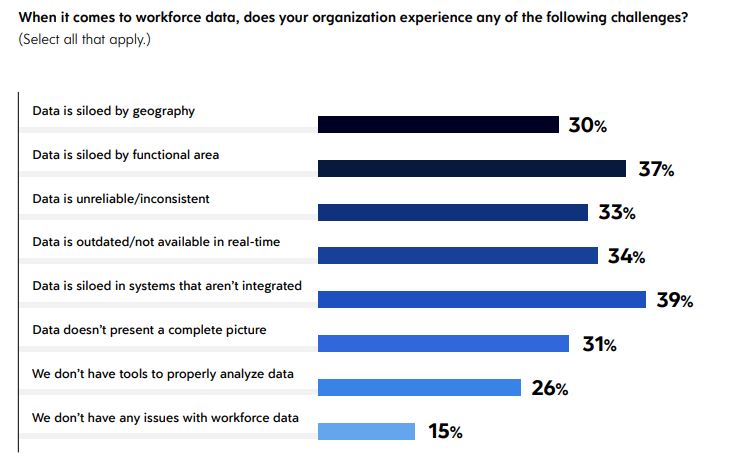70% of leaders are confident about employer resilience
Their mindset is right, but do they have the right tools and processes in place to respond to further disruptions?
Why You Should Care
The workplace is going to continue to evolve over the coming years.
What must companies do to prepare now?
Ceridian has some advice ranging from closing skills gaps, better succession planning and a focus on tech. Read on to find out more!
COVID-19 changed the world of work forever. By forcing millions across the world to work from home, the pandemic accelerated the digital transformation that was already going on inside businesses.
But COVID-19 is far from the last disruption employers will have to face; remember, the world is living through the most competitive labor market of the 21st century – it has been dubbed the ‘Great Resignation’.
In light of incoming challenges, Ceridian surveyed 2,000 business leaders from across the world about the resilience of their organization.
More than 70% said they were very or extremely confident about their organization’s ability to deal with disruptions quickly, this included data breaches, a reputation crisis or labor shortages. But “beneath that confident façade are challenges to overcome and work to be done”, according to Ceridian’s Executive Survey report.
The main barriers employers are facing in managing disruption and being a change-ready organization are budget constraints (44%), labor shortages (37%) and the lack of technology (33%).
Exploring skills and tech challenges
Ultimately, Ceridian’s research suggests that the ‘Great Resignation’ is impacting organizational resilience. But these labor shortages are also playing into another challenge for employers: skills gaps.
Ceridian is clear that it is very hard for employers to be resilient when employees don’t have the right skills to enable the business to be competitive.
72% of those surveyed think that employers must bear the responsibility for learning, but actions speak louder than words. Just over half (52%) are investing in new technology to identify and track skills gaps, and only 42% are bolstering their talent acquisition processes to ensure they can fill the gaps.
Instead, Ceridian notes that employers need to have a culture of learning if they want to thrive in the next iteration of the workplace.
Another challenge is technology. While there has been significant progress in adoption since 2020, there is still a lot more work to be done.
40% don’t have the systems in place that they need – there is a particular lack of labor planning software (like a human capital management (HCM) system), which is essential to winning in the ‘Great Resignation’ and the skills crisis.
53% said their HCM is not integrated into other systems, and 43% say the HCM doesn’t provide the right data. Just 15% said they generally had no issues with their people data – the biggest challenges were siloed and outdated data.
Without access to the right, good quality data, it is incredibly hard to adjust to rapid change going on in the workplace.

Credit: Ceridian’s 2022 Executive Survey.
It’s time to focus on leaders
Ceridian is clear that resilient organizations must have good leaders; “Having strong leaders in place today and a pipeline of leadership for tomorrow are essential for an organization to effectively weather change”.
While 88% are embracing succession planning, this is largely incomplete and mainly focused on senior leadership roles. While 73% of respondents have succession planning for senior roles, just 49% have the same processes in place for people leaders despite HR being a core segment of change-ready businesses.
The issue with not having succession planning for leaders is organizations risk having vacancies that are essential to the day-to-day operations of the business. 43% of key leadership roles remain vacant for four months or longer, according to Ceridian’s study.

Credit: Ceridian’s 2022 Executive Survey.
Talking about this element of the study, Ceridian managing director and regional leader for EMEA Wendy Muirhead shares exclusively with UNLEASH: “The Executive Survey results identified succession planning as a key area of focus for business leaders, and the best performing firms have people strategies which provide talent development opportunities for employees throughout the organisation, and across levels of seniority, as a whole.
“Firms should also avoid key succession planning pitfalls, such as only focusing strategies on senior leadership roles, or implementing policies but not measuring their effectiveness.”
To achieve this, employers need to invest in technology to proactively identify and develop managers (and employees more generally), “so you can fill key roles before there is turnover”, according to Ceridian’s report.
The time to act is now, otherwise your organization will be left behind in the ‘Great Resignation’ and in future workplace disruptions.
Sign up to the UNLEASH Newsletter
Get the Editor’s picks of the week delivered straight to your inbox!

Chief Reporter
Allie is an award-winning business journalist and can be reached at alexandra@unleash.ai.